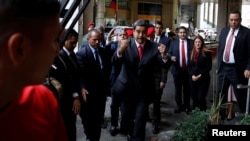U.S. lawmakers on Tuesday applauded heightened economic and diplomatic pressure on Venezuela after a much-criticized presidential election, but openly admitted that no easy solutions exist for the country's deepening crisis.
With his country in the throes of economic collapse, Venezuelan President Nicolas Maduro won re-election Sunday in a vote boycotted by the opposition and slammed by the Trump administration as a fraud. The Senate's No. 2 Republican, John Cornyn of Texas, summed up Venezuela's crisis this way:
"What a mess," he said. "I'm not clear what should happen now, but it should be a matter of U.S. concern because a lot of people are hurting [in Venezuela] and it's also in our backyard."
Another Republican, Arizona Senator Jeff Flake, echoed the sentiment, saying, "It's a terrible humanitarian situation there. You want to find ways to make Maduro change his calculus, but nobody has very good ideas right now."
On Monday, President Donald Trump signed an executive order restricting U.S.-Venezuelan oil transactions and making it harder for Venezuelan officials to profit from selling off the country's assets.
Democratic Senator Tim Kaine of Virginia said further sanctions were appropriate but must be applied with care.
"You don't want to hurt people," he cautioned. "The overuse of sanctions gives a dictator who's mismanaging a country the ability to say, 'You're suffering because of Uncle Sam,' whereas in reality they're suffering because Maduro has run his country into the ground."
Venezuela has suffered hyperinflation, chronic shortages of food and basic goods, and a collapse of public services as the country's oil revenues plummeted amid reduced petroleum output and, until recently, low crude prices.
Maduro became president after socialist firebrand ruler Hugo Chavez died of cancer in 2013.




